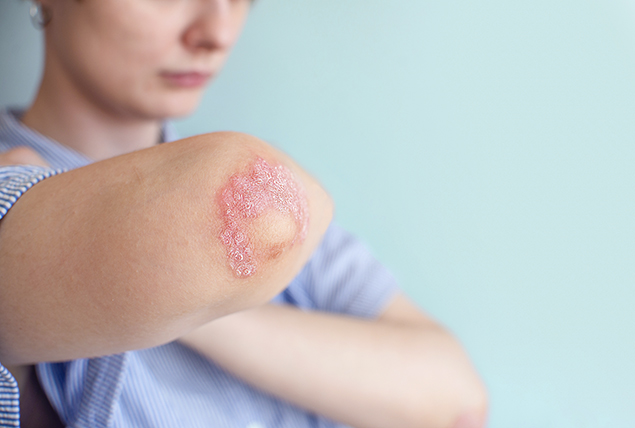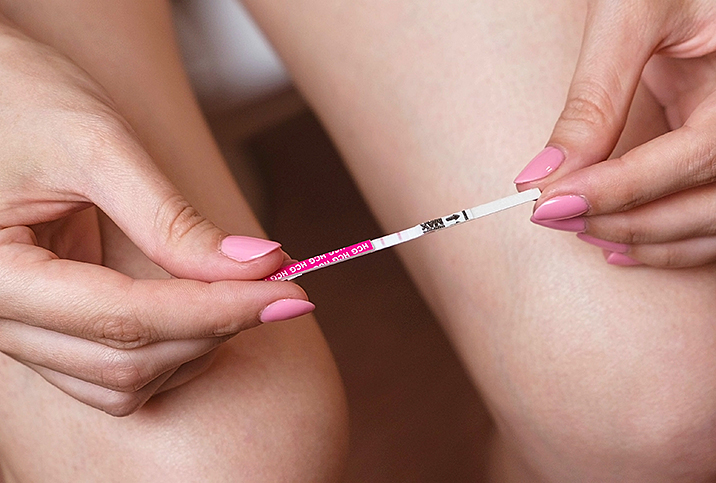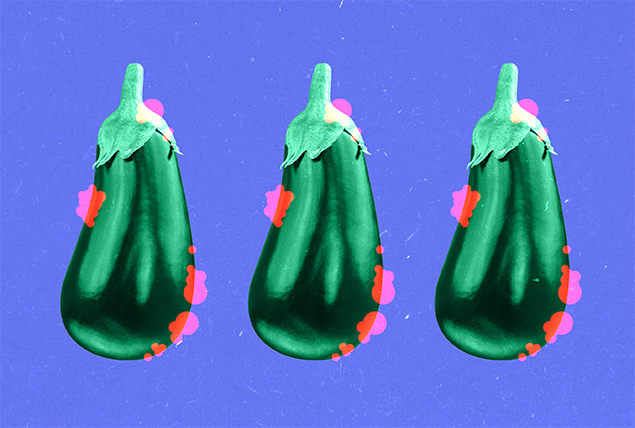Can Psoriasis Cause Infertility in Women?

Psoriasis is an autoimmune skin disease in which skin cells grow too fast. This causes our immune system to mistake healthy cells for threats and attack, leaving red, flaking skin or pustules.
Psoriasis is known to affect male fertility by causing systemic inflammation that in turn affects multiple systems in the body. This can include changes to hormone levels and the quality of sperm.
But is there a link between psoriasis and female infertility?
What are the different types of psoriasis?
There are several different kinds of psoriasis. The severity of psoriasis depends on the type, the person's general health and the environmental triggers.
"The most common areas for most people affected by psoriasis are the elbows, knees, scalp and lower back. However, it can affect any part of the body, including the nails and groin area," said Jeremy Fenton, M.D., a board-certified dermatologist practicing both cosmetic and general dermatology, and the medical director for Schweiger Dermatology Group in Long Beach, New York. "It is not the most common, but we often do see psoriasis directly on the genitals."
'If you're trying to get pregnant, I would recommend taking whatever lifestyle modification you have found to be helpful to improve psoriasis in the skin.'
Fenton noted the most common types of psoriasis:
- Chronic plaque psoriasis. Red, scaly plaques with thickened and flaking skin appear on the elbows, knees, scalp and at the bottom of the back.
- Guttate psoriasis. This form typically affects children and adolescents. It's most likely to appear after an infection, particularly a strep infection. Guttate psoriasis presents as red, scaly patches, but they are widely distributed and smaller.
- Inverse psoriasis. This psoriasis appears in the skin folds such as in the groin, underarms, belly button and under the breasts. It tends to look red with minimal scaling or thickening of the skin.
- Nail psoriasis. This type accompanies any other form of psoriasis and leads to pits or indentations in the nail. It may include a separation of the nail from the nail bed—leading to discoloration in the nail—or oil spots. It may also present as a thickening of the nails and white spots.
- Palmoplantar psoriasis. Primarily affecting the hands and feet with red, flaking and thickened skin with occasional pustules, this form can be quite painful.
- Pustular psoriasis. A less common type of psoriasis, it presents with red patches but fewer pustules and less scaling.
What triggers psoriasis?
The exact cause of psoriasis is unknown, but many factors can cause symptoms to flare up and exacerbate struggles with the condition.
Some of the more common psoriasis triggers include the following:
- Beta blockers, such as lithium or antimalarials
- Consumption of tobacco products
- Heavy use of alcohol
- High levels of stress and anxiety
- Extreme weather
- Infections and illnesses
- Scratches, bruising, insect bites, tattoos or other skin irritants
"We know that stress can worsen inflammatory skin diseases like psoriasis and atopic dermatitis, telling us that there is indeed a connection between our nervous system and the skin," said Tina Bhutani, M.D., M.A.S., a board-certified dermatologist, advisor to Zerigo Health and co-director of the Psoriasis and Skin Treatment Center at University of California, San Francisco Health.
"Patients with these same diseases are also more likely to also have or develop mental health disorders such as depression or anxiety," she added.
Is there a relationship between psoriasis and infertility in women?
Psoriasis can affect fertility in men. As was briefly discussed earlier, the chronic inflammation caused by psoriasis can increase the total amount of stress a man's body is going through, which spikes cortisol levels and subsequently reduces testosterone production. As a result, sperm count and sperm quality may be reduced, and that affects fertility and reproduction.
Knowing psoriasis contributes to male infertility, it's natural to believe psoriasis may affect women's fertility, too. But is that accurate? Can psoriasis interfere with a woman's ability to conceive?
A recent case-control study carried out in Denmark published in June 2022 found an association between psoriasis and ectopic pregnancy (EP), with a confirmed absolute risk of 3.98 percent. Since the prevalence of EP in Denmark is noted to be about 1 percent, the association was recognized as being significant.
The study looked at data collected from 1973 to 2017 and involved a total of 491,274 women. The study authors concluded that women of reproductive age with moderate to severe psoriasis should take particular care.
Ectopic pregnancy is a complication in which the fertilized egg wrongly implants itself outside the womb, typically in the fallopian tubes. It's one of the leading causes of mortality in the first trimester of pregnancy.
It's fair to say there have been few studies regarding psoriasis and adverse pregnancy outcomes (APOs). Even so, it appears that the condition does not affect a woman's ability to get pregnant, although it may present minor physical challenges in certain cases.
Can psoriasis treatment affect pregnancy?
Topical therapies and systemic agents are the common treatments used to help control psoriasis.
The most commonly used topical treatment for psoriasis is steroid creams or ointments. They work by reducing inflammation, slowing down the production of skin cells and reducing any itching.
Methotrexate is a widely used systemic agent and is recommended for its effectiveness because of its immunosuppressive effects.
There have been no thorough clinical studies that can clearly draw a connection between medications for psoriasis and fertility.
"Make sure that both your dermatologist and your OB-GYN are aware of your psoriasis and the treatments that you are using or planning to use," Bhutani said. "There should be a shared discussion to choose treatments that keep psoriasis in control while still being safe for pregnancy."
The bottom line
Untreated psoriasis can be painful. While your treatment plans may need to shift due to conception and pregnancy, there are lifestyle changes that you could make that would help.
"If you're trying to get pregnant, I would recommend taking whatever lifestyle modification you have found to be helpful to improve psoriasis in the skin," Fenton said.
People with psoriasis can improve their quality of life by taking a few important steps, according to Bhutani:
- Find an effective medical treatment.
- Keep stress levels low through exercise, self-care, and techniques like mindfulness or meditation.
- Maintain social connections with family and friends.
- Optimize sleep quality.
- Work with a dermatologist.
"A well-rounded approach is important to make sure that we are treating not only the patient's skin but also helping to improve quality of life," Bhutani explained. "This will help to get maximal benefit from the prescribed medical treatments but also will decrease the chances of having flare-ups while on treatment."


















